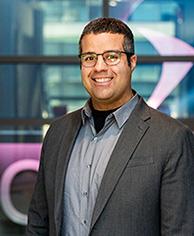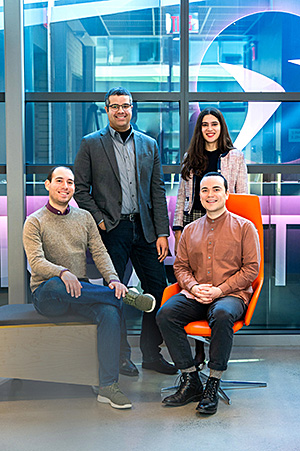Making Space Sustainable
How MIT Researchers are Steering Space Policy

Professorships and fellowships are the engines of innovative research at MIT, and many of them are supported by planned gifts. This funding has been critical for researchers at the MIT Astrodynamics, Space Robotics, and Controls Lab (ARCLab) to follow timely opportunities as they work to further space exploration and the Earth-bound policies that affect it.
When the first satellites entered Earth’s orbit in the mid-20th century, it seemed impossible that space would ever want for, well, space. But the steady increase of spacecraft in low Earth orbit (LEO)—up to 1,200 miles from the Earth’s surface—has risen steadily since then, with an exponential leap in the past decade. The risk of collisions and debris in LEO looms large while remaining out of most Earth-dwellers’ sights.
“Our future as a spacefaring civilization could be at risk due to this debris,” says Richard Linares, the Rockwell International Career Development Professor and ARCLab lead (pictured above). “There’s a global need for us to come together and understand how we can ensure that space becomes sustainable.”
Linares joined MIT’s Department of Aeronautics and Astronautics in 2018 and founded ARCLab, which is a member of MIT’s Small Satellite Collaborative—a group of labs working together to advance novel research and education on small satellites, including their missions, subsystems, and payloads, enabling new technologies and increasingly complex applications. Back then, the idea of “sustainability in space” hadn’t reached the mainstream. “Our lab saw that space debris in low orbit could be a big problem,” he says. “Since then, major space agencies have confirmed it. The forward-thinking research environment at MIT allowed us to get a head start on what we saw would be most impactful, and now we’re at the forefront of this field.”
“The Rockwell Career Development professorship has definitely given me more freedom in my research.”
–Richard Linares
A shared vision.
One recent innovation in Linares’s group was the MIT Orbital Capacity Assessment Tool (MOCAT) launched in December 2023. MOCAT is open-source software that allows users to model the long-term future space environment, furthering their understanding of the growth in space debris to prevent collisions and overpopulation. “The goal of the tool is to get a handle around the overall capacity—a complicated quantity with a lot of different variables,” says Linares. “With this tool, we can try to quantify the correct orbital capacity and how many satellites we can operate in space safely and in a sustainable way.”
The open-source aspect of the software is important to promote a transparent, international vision of space. “If we are going to make effective regulatory decisions, both companies and policymakers need access to the same open-source tool that can be used in that decision process,” Linares says. “That was our goal in making MOCAT accessible to the community—to encourage academic research but also encourage transparency among regulators and satellite operators.”
“Having fellowships totally changes the game for a graduate student.”
–Thomas González Roberts
MOCAT is one tool that could help determine the future of LEO regulations, which Linares argues requires a multifaceted approach on a technical—both hardware and software—political, and industry front. ARCLab’s fellow research groups in the MIT Small Satellite Collaborative take different approaches to the obstacles objects face when moving through space, presenting different collaboration opportunities. “The space debris problem requires a holistic component—not just simulation but hardware,” he says. “We also need more technically minded policymakers who can pursue technically sound solutions to this problem internationally. With the interdisciplinary research that’s going on at MIT, we’re in a good position to address this problem.”
Vital support.

and graduate students Adriana Mitchell,
Thomas González Roberts,
and Miles Lifson.
The progress that ARCLab has made, Linares said, could not have been made without early and consistent philanthropic support through professorships and fellowships for graduate researchers. “The Rockwell Career Development professorship has definitely given me more freedom in my research,” he says. “In the years since receiving it, I’ve seen how it directly enabled many of our papers and funded travel for me and my students to important conferences around the world, which gave projects like MOCAT more visibility and momentum. Thanks to those opportunities, we’re set up to be a leader in solving this societal problem.”
ARCLab, Across the Universe
Low Earth Orbit
Miles Lifson SM ’20, PhD ’24
Research focus: My research is on developing ways to coordinate and understand how groups of satellites use low Earth orbit. Working on MOCAT has been a highlight of my time at MIT. I am inspired by the belief that MOCAT will help us all collectively arrive at better answers to the hard questions and trade-offs we’ll have to adjudicate in the coming years about how to manage space.
Fellowship impact: The MathWorks Fellowship I received enabled me to pursue my thesis research and develop the theoretical basis for parts of what we implemented in MOCAT. The fellowship gave me the freedom to explore high-risk research directions and to develop research that has translated to subsequent publications, grants, and advice to policymakers.
Geostationary Earth Orbit
Thomas González Roberts SM ’21, PhD candidate
Research focus: I model the near-Earth space environment to contribute to world order in space, using principles from observational astronomy, ground-based telescopes, and radar systems to track and characterize satellite locations primarily about 20,000 miles above the Earth. I apply that to understanding the network of rules, laws, and treaties that govern space behavior from an international relations standpoint to contribute to evidence-based rules and policymaking.
Fellowship impact: Having fellowships totally changes the game for a graduate student, and I know that because I wasn’t on one when I started at MIT. I’ve since received funding from various sources, including the National Science Foundation and Schmidt Futures. It’s important to have the freedom and time to design and execute a research project well enough to become the kind of thought leader that MIT is so good at producing.
Deep Space
Adriana Mitchell SM ’21, PhD candidate
Research focus: I am researching the improvement of robust autonomous visual navigation algorithms under variable illumination conditions, focusing specifically on terrain-relative navigation during planetary entry, descent, and landing. Currently, I am collaborating with NASA’s Jet Propulsion Laboratory on applying and validating my developed algorithms on NASA Lunar and Martian image datasets.
Fellowship impact: One example of a fellowship providing research flexibility was the incredible six-month research abroad opportunity funded by the MIT Progetto Rocca Fellowship and the national GEM Fellowship. At the Polytechnic Institute of Milan, I collaborated with their Deep-space Astrodynamics Research and Technology group on creating visual navigation image-processing techniques to be used onboard the European Space Agency CubeSat M-Argo.
Take Action
For many of the graduate students working with Richard Linares in ARCLab, the financial support provided by their fellowships gives them the freedom to do their work. Planned giving donors, both during their lifetimes and through estate gifts, continue to be champions of this type of student support.
Contact the MIT Office of Gift Planning at giftplanning@mit.edu to find out how your bequest or other type of planned gift can support out-of-this-world research.
